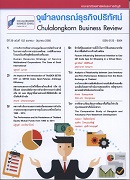การศึกษาเปรียบเทียบการพัฒนาพื้นที่ริมน้ำท่าเรือกรุงเทพและท่าเรือโยโกฮาม่า
Main Article Content
Abstract
บทคัดย่อ
ท่าเรือกรุงเทพเป็นท่าเรือที่เกิดขึ้นและเติบโตควบคู่กับการพัฒนาทางเศรษฐกิจของประเทศไทย หากแต่บทบาทของท่าเรือกรุงเทพได้ลดลงตามลำดับ เนื่องจากผลกระทบด้านจราจร การส่งเสริมการใช้ท่าเรือแหลมฉบัง และการเปลี่ยนแปลงในโครงสร้างทางสังคมและเศรษฐกิจของประเทศในช่วงหลายปีที่ผ่านมา งานวิจัยนี้เป็นงานวิจัยเชิงคุณภาพ ที่ทำการศึกษาการพัฒนาของท่าเรือโยโกฮาม่าและพื้นที่โดยรอบ ด้วยมุมมองประวัติศาสตร์ (Historical Approach) และการสัมภาษณ์ผู้ที่เกี่ยวข้อง โดยอ้างอิงกรอบการวิเคราะห์ตามหลักทฤษฎีสถาบัน (Institutional Theory) และทฤษฎีผู้มีส่วนได้ส่วนเสีย (Stakeholder Theory) เพื่อชี้ให้เห็นกระบวนการและปัจจัยที่ผลักดันให้เกิดการพัฒนาในท่าเรือโยโกฮาม่าและการพัฒนาของพื้นที่รอบท่าเรือ ผลการวิเคราะห์สามารถนำเสนอแนวทางนโยบายในการพัฒนาพื้นที่ริมน้ำท่าเรือกรุงเทพให้เกิดการพัฒนาที่ยั่งยืนและสัมฤทธิผล
คำสำคัญ ท่าเรือกรุงเทพ ท่าเรือโยโกฮาม่า การพัฒนาพื้นที่ริมน้ำ ทฤษฎีสถาบัน ทฤษฎีผู้มีส่วนได้ส่วนเสีย
Abstract
Bangkok Port was developed and grown together with the development of Thai economy. However, the role and importance of its have been dropped in recent years due to traffic problem, the opening of Lamchabang port and the change in social and economic structure. This qualitative research studies the development of Yokohama port and its surrounding area using historical approach and in-depth interview with the stakeholders. Based on the analysis under the framework derived from institutional theory and stakeholder theory, the mechanism and factors that drove the development of Yokohama port and its surrounding area were identified. The analysis results can provide the sustainable and efficient guideline policy to develop Bangkok port waterfront area.
Keywords: Bangkok port, Yokohama port, waterfront development, institutional theory, stakeholder theory
Article Details
Opinions and discussions in papers published by the Creative Business and Sustainability Journal (CBSJ) are deemed as personal opinions and the responsibility of the writers. They are not the opinions or responsibility of the Chulalongkorn Business School of Chulalongkorn University.
Papers, content, information etc. appearing in the Journal are deemed to be the copyright property of the Chulalongkorn Business School of Chulalongkorn University. Anybody or any organization that wishes to publish any part of them or use them in any way must obtain written permission from the Chulalongkorn Business School, Chulalongkorn University.


